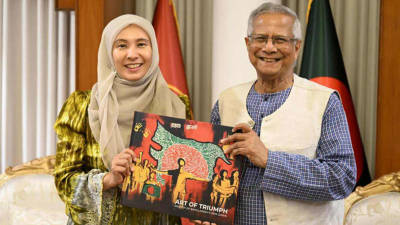PETALING JAYA: Bangladesh’s renewed bid to join Asean has divided opinion among Malaysian experts, with some warning of geopolitical fallout and others highlighting possible strategic and economic gains for Malaysia.
The proposal re-emerged after a meeting in Dhaka last week between PKR deputy president Nurul Izzah Anwar and Bangladesh’s interim leader Muhammad Yunus, who appealed for Malaysia’s support for the South Asian nation’s entry into the 10-member regional bloc. But analysts remain split on the viability of the move and its implications for Asean unity and Malaysia’s national interests.
Nusantara Academy for Strategic Research senior fellow Dr Azmi Hassan questioned the logic of including Bangladesh, noting that it lies well outside Asean’s traditional geographic boundary.
“Compared with Timor-Leste, which is within the Asean region, Bangladesh is quite distant.”
Azmi said a similar proposal to admit Papua New Guinea, supported by Indonesia at last year’s Asean Summit, failed to gain traction.
“If Papua New Guinea didn’t get support from Asean members, then even less so for Bangladesh,” he said, adding that Dhaka’s entry could stir geopolitical sensitivities involving both Pakistan and India.
“Among the 10 Asean member states, I doubt there would be much support for Bangladesh’s inclusion.
“In contrast, Timor-Leste had strong backing from Malaysia and Thailand. For Bangladesh, I don’t see any member likely to champion its entry.”
On the other hand, International Islamic University Malaysia international law and relations expert Assoc Prof Dr Mohd Yazid Zul Kepli said Malaysia could stand to gain strategically from supporting Bangladesh’s bid, particularly in trade, energy and maritime security.
“Economically, Malaysia could benefit from greater market access, increased investment flows and labour cooperation, given Bangladesh’s large workforce and growing economy.”
Still, Mohd Yazid acknowledged the geopolitical risks, particularly the risk of India gaining indirect influence within Asean, which could complicate the bloc’s relationship with China.
“Malaysia should navigate this by framing Bangladesh as a neutral economic partner and emphasising shared development goals.”
He added that closer Asean ties could lead to better protections for Bangladeshi workers in Malaysia – one of the country’s largest migrant groups – although any expansion must be approached with caution.
“Expanding Asean’s size is not necessarily good. There should be in-depth analysis of the pros and cons.”
Economist Prof Dr Geoffrey Williams offered a more critical perspective, warning that Asean is too fragmented to consider enlargement at this stage.
“Asean is not yet ready for expansion and inclusion of unstable new members,” he said, citing the unresolved tensions between Thailand and Cambodia.
Williams said Malaysia does not need Asean to deepen its ties with Bangladesh.
“Any economic benefits can be achieved through a free trade agreement with Bangladesh, covering the free movement of labour and capital and zero tariffs. Asean membership is not necessary.”
He also dismissed the idea that the bloc would improve governance of regional labour migration.
“Improved labour mobility can happen if Malaysia removes the agency system and cuts corruption and vested interests.”
Williams added that Asean’s internal diversity – spanning absolute monarchies, military regimes and one communist one-party state – already presents significant obstacles to integration.
“Adding new countries will only make integration more difficult.”
Asean has never yet admitted a country outside Southeast Asia. Timor-Leste remains the only non-member in the process of formal accession. Papua New Guinea, despite previous interest, has yet to garner sufficient support.
